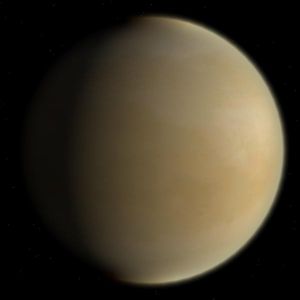Difference between revisions of "Venus"
Jump to navigation
Jump to search
m ({{Planet-Stub}}) |
m (changed to complex flight model) |
||
| Line 2: | Line 2: | ||
'''Venus''' is the second planet from the [[Sun]]. It has no natural satellites. | '''Venus''' is the second planet from the [[Sun]]. It has no natural satellites. | ||
| − | At the surface of Venus, the atmospheric pressure is 9.2MPa, over 90 atmospheres. This is substantially greater than the back-pressure which standard rocket motors are able to generate; a [[Delta-glider]] landed on Venus will not be able to take off (at least if the | + | At the surface of '''Venus''', the atmospheric pressure is 9.2MPa, over 90 atmospheres. This is substantially greater than the back-pressure which standard rocket motors are able to generate; a [[Delta-glider]] landed on Venus will not be able to take off (at least if the [[complex flight model]] is in use). |
see also: Wikipedia [http://en.wikipedia.org/wiki/Venus] | see also: Wikipedia [http://en.wikipedia.org/wiki/Venus] | ||
Revision as of 08:47, 25 April 2006
Venus is the second planet from the Sun. It has no natural satellites.
At the surface of Venus, the atmospheric pressure is 9.2MPa, over 90 atmospheres. This is substantially greater than the back-pressure which standard rocket motors are able to generate; a Delta-glider landed on Venus will not be able to take off (at least if the complex flight model is in use).
see also: Wikipedia [1]
Go to Addons for Venus
| edit The Solar System | |
|---|---|
| Central star |
Sun (Sol) |
| Planets |
Mercury - Venus - Earth - Mars - Jupiter - Saturn - Uranus - Neptune |
| Natural satellites |
Moon - Phobos - Deimos - Io - Europa - Ganymede - Titan - more... |
| Add-ons |
Planets - Dwarf Planets - Small objects - Natural satellites - Alternative star systems |
 | This article, about a planet, is a stub. You can help Orbiterwiki by expanding it. |
